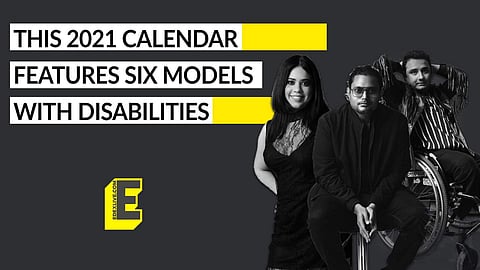

It was only a few weeks ago that Purva Mittal stepped out of her house for the first time since the beginning of the lockdown. A Delhi University PhD scholar affected by Spinal Muscular Atrophy, Purva says that she falls under the high-risk category, when it comes to COVID vulnerability. Going outside this time, she says, was the best part of 2020. "After all, it wasn't all that bad," she laughs.
She went out because she had to try and be a model for the first time, to be featured on two pages of a calendar. She gets excited when she tells us how excited she was to put on makeup, strike a pose and laugh wholeheartedly in front of a camera, while photographer Rishab Dahiya clicked her photographs in a studio in Delhi. The calendar named Oddity: Don’t Bend, Don’t Blend features the photographs of six models with disability. It is the brainchild of Purva and Rishab, to increase awareness around disability and raise funds to help out six organisations (each nominated by a model) that work for disability rights. The calendar will be released on December 3, the International Day of Persons with Disabilities.
"I really wanted to try out modelling, so I developed this concept and got myself to pose as a model," Purva jokes. Rishab and another model and Faisal Ashraf Nomani who joined us over Zoom, laugh. Faisal, who is a researcher and a disability rights activist, had also tried out modelling for the first time. "We wanted to do a fun shoot with people who have had a difficult life. We wanted to show the fun side of their lives. At the same time, wanted the models to feel beautiful and comfortable," says Purva, reminiscing how the entire crew was so sensitive and supportive. "We wanted an amalgamation of visible and invisible difficulties, ensuring that everyone was safe and secure. We came up with the idea because we wanted more visibility and acceptance. We do not want sympathy, but friendship and to be able to joke about things and lighten the mood," she says. While the initial idea was to shoot with 12 models, they had to settle with six, given the COVID restrictions and time.
Rishab says that the whole idea was executed in less than a week and that the shoot was done in two days. "Most of my shoots involve actors and models and I always look for opportunities to do something different. That's when this idea hit me. I knew Purva since the time she was in college and she also had a similar idea," he says. There isn't anything different about the models in any of these images. They are happy and confident in their skins. "Usually, if it's a shoot of people with disabilities the tone set is really serious. But we wanted to show that the disability is not their identity, but a part of it," says Rishab. ''
Of all the six models featured, Pranav Bakhshi was the only one with prior modelling experience. At 20, he is India's first fashion model with autism. "Pranav was the easiest to shoot. He was quite calm, unlike me, who threw a lot of tantrums," laughs Purva, recalling her first professional photo shoot.
A newbie here, Faisal says, "There are so many myths and misconceptions about people with disabilities. People tend to believe that they aren't happy. We wanted to break this myth." The others called him the life of the shoot and even though the shoot was a few weeks ago, Faisal still couldn't contain his excitement. "We had a lot of fun and I had makeup on for the first time. I couldn't believe that that was me!" he exclaims.
The shoot was a breeze for the models and the photographer, they say. However, Rishab tells us about how it made him rethink accessibility altogether. "The shoot was an easy one. However, never in a previous shoot had I thought of how accessible a studio is for a wheelchair user like Faisal," he says. Purva adds, "Through this calendar, we want to tell people that people with disability are not characters out of a fairy tale, but are part of the society. We are not a minority. A disability can happen to you anytime, even in your late 40s and we want society to be able to accept it and celebrate differences."
